Opening the packages turned out to be a pleasure all its own, one I’ve never forgotten. Every package I’ve opened since has had a sweet association with the packages that held those books. Each volume was individually wrapped within a carton of its own. My mother and I unpacked the books and lined them up on the floor. We had no bookcase for them. The cardboard and wrapping accumulated in a heap, a messy jumble, like my state of mind following the research I had been trying to do, something to be discarded. The alphabetical, rectilinear orderliness of the books said that knowledge was orderly and limited. They seemed to promise a short, direct path to a neat, clean answer to my Big Question. The truth was, though, that I already knew there was no short path, because I had tried using encyclopedias at school. Instead of finding the answer to the question in them, I had found a fascinating place to wander. That was why I wanted a set at home. In the years that followed I sometimes used my encyclopedia in the usual way, as a reference—I “looked things up”—but only when I had to, because I really didn’t think that was the best use for the books. They were much better thought of as a town, where I was a tourist, invited to ramble through the streets, with no obligations or destinations to keep me from rambling. Invited to ramble that way, to explore the side streets, peek into the houses, who would choose to walk a straight line along the high street? Not me, certainly not at eleven, and not yet at forty-six. Time enough later for the grim business of getting somewhere.
I read through the encyclopedia, book by book, but not from beginning to end, not deliberately and not thoroughly. I wandered it like a child crawling through tall weeds, rambling, like a walker without a compass or a map, who chooses his route from the sound of the street names, going nowhere, anywhere, everywhere, for the pleasure of the going, of meandering, a pleasure different from any I’d gotten from books before.
Every book promises something. You know that feeling just before you begin reading: the delightful anticipation of that something, the thing that this book will yield to you. Of course, some books never deliver the promise of that anticipatory moment, but even the worst of books has something in it. The magnificent thing about the books I was unwrapping was that they promised not just something but everything, and at that moment when the encyclopedia arrived I realized that everything was exactly what I wanted to know. Years later, when I began to write books myself, I knew—and this is the first time I’ve said it—that I really wanted to write a book about everything.
I opened one of the books and began reading. I wish I could remember where I began. What article was it? With my mother looking over my shoulder, I would probably have chosen something related to Miss Rheingold’s question, but what? We’d been taught to use “key words” in a question to decide what topic to consult in an encyclopedia, but there were no entries for where, do, you, or stop. Maybe I didn’t choose an article related to the question. Maybe I just opened a book at random. It doesn’t matter now; that is, it doesn’t matter for this reminiscence, but it matters a great deal for the progress of my intellectual development at eleven, because the first article led me to all the rest. I began reading, and I read until dinner time, following the cross-references that led from that one article to another, from that to another, and from another to another, following the route of cross-references, a stroll defined by divagation, a diversion at every corner.
[to be continued]
In Topical Guide 626, Mark Dorset considers Metaphors and Similes: Wandering the Streets of a Town; Allusion; and Organization: Methods of: Cross-Reference from this episode.
Have you missed an episode or two or several?
You can begin reading at the beginning or you can catch up by visiting the archive or consulting the index to the Topical Guide. The Substack serialization of Little Follies begins here; Herb ’n’ Lorna begins here; Reservations Recommended begins here; Where Do You Stop? begins here.
You can listen to the episodes on the Personal History podcast. Begin at the beginning or scroll through the episodes to find what you’ve missed. The Substack podcast reading of Little Follies begins here; Herb ’n’ Lorna begins here; Reservations Recommended begins here; Where Do You Stop? begins here.
You can listen to “My Mother Takes a Tumble” and “Do Clams Bite?” complete and uninterrupted as audiobooks through YouTube.
You can ensure that you never miss a future issue by getting a free subscription. (You can help support the work by choosing a paid subscription instead.)
At Apple Books you can download free eBooks of Little Follies, Herb ’n’ Lorna, and Reservations Recommended.
You’ll find overviews of the entire work in An Introduction to The Personal History, Adventures, Experiences & Observations of Peter Leroy (a pdf document), The Origin Story (here on substack), Between the Lines (a video, here on Substack), and at Encyclopedia.com.

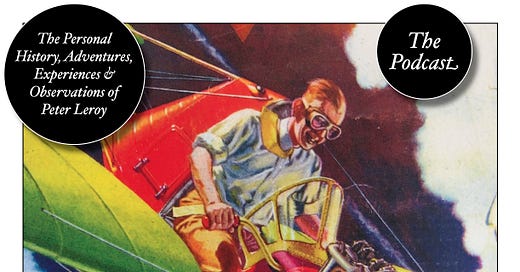







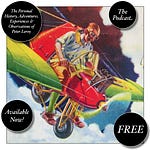
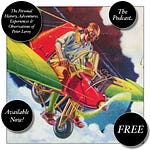
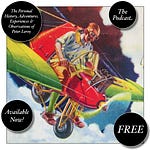
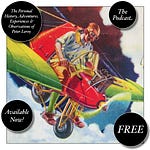

Share this post